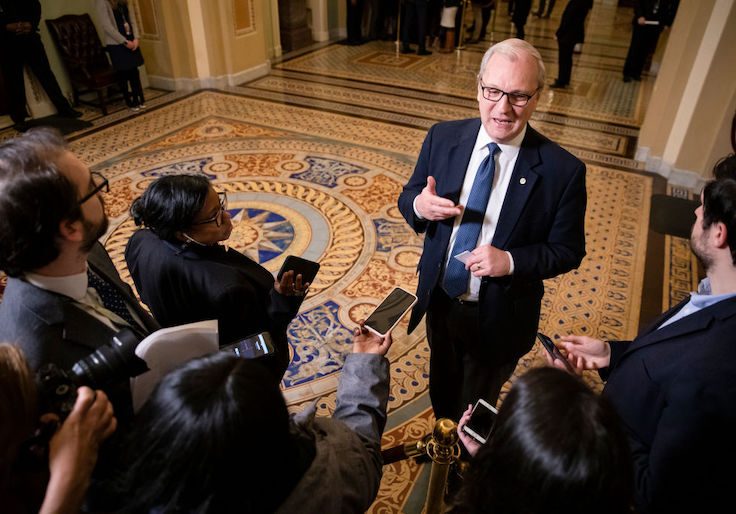Republican senators are launching a new inquiry into the troubled coronavirus relief program to ensure that banks are not discriminating against small businesses in the gun and energy industries among others.
A group of 19 GOP lawmakers sent a letter to the Small Business Administration, Treasury Department, and Federal Reserve late on Tuesday to ensure that banks are not withholding loans from certain industries. The senators, led by Kevin Cramer (R., N.D.), expressed concerns that some of the biggest banks administering the Paycheck Protection Program have previously refused to do business with companies in the oil, gas, coal, prison, and—especially—gun industries, according to a copy of the letter obtained exclusively by the Washington Free Beacon. Ted Cruz (Texas), Tom Cotton (Ark.), Rick Scott (Fla.), Josh Hawley (Mo.), and Ben Sasse (Neb.) were among the Republicans who signed the letter.
"A vocal but small minority has weaponized federally-backed banks against politically disfavored businesses that operate in good faith and compliance with the law, by denying them financial services based on political reasons that have nothing to do with creditworthiness," the senators wrote. "Small business creation and ownership are the backbone of many of these industries and access to competitive and predictable capital, loans, and other financial services are critical as they seek to recover from the economic impacts of the Covid-19 pandemic."
In the past, some of the country's biggest corporations have publicly announced they would not do business with gun companies that did not comply with demands to stop making or selling certain guns. In 2018, Citibank threatened to stop working with gun companies that legally sold guns to adults under the age of 21.
Banks are already facing scrutiny over their handling of the program following revelations that at least $800 million in loans went to publicly traded companies, rather than the small businesses PPP was meant to serve. Banks have already been hit with lawsuits alleging that they favored larger businesses because of the increased fees they could withdraw from the fund, which ran out of its initial $349 billion funding. The program has since received an additional $310 billion.
Second Amendment activists have said the gun industry is already being shut out of major credit markets and fear that the coronavirus could be exploited by financial institutions to damage small businesses.
"Lawful, compliant and in some cases, Constitutionally protected industries have been the subject of discriminatory policies enacted by big businesses in the marketing, communications, internet service and financial services sectors for years," Lawrence G. Keane, general counsel for the National Shooting Sports Foundation, said in a statement. "Corporate leaders projecting their biases through discriminatory policies are now attempting to use a global pandemic to advance their strategy of shutting down businesses that they find objectionable."
Senate Banking Committee member Kevin Cramer (R., N.D.), who has introduced legislation to protect the industry from financial discrimination in the past, spearheaded the new inquiry. The senators are asking regulators to take steps to ensure that banks are not using their prior public commitments to deny certain industries access to the relief program.
"We find it extremely disconcerting that, while the vast majority of SBA program lenders do not promote financial discrimination policies, many of the nation’s largest institutions currently do," the senators said in the letter.
The letter was also signed by Sens. John Cornyn (R., Texas), Rand Paul (R., Ky.), Steve Daines (R., Mont.), Mike Lee (R., Utah), Shelley Moore Capito (R., W.V.), Cindy Hyde Smith (R., Miss.), Joni Ernst (R., Iowa), John Barrasso (R., Wy.), Mike Braun (R., Ind.), John Thune (R., S.D.), John Hoeven (R., N.D.), Lisa Murkowski (R., Alaska), and James Inhofe (R., Okla.).
